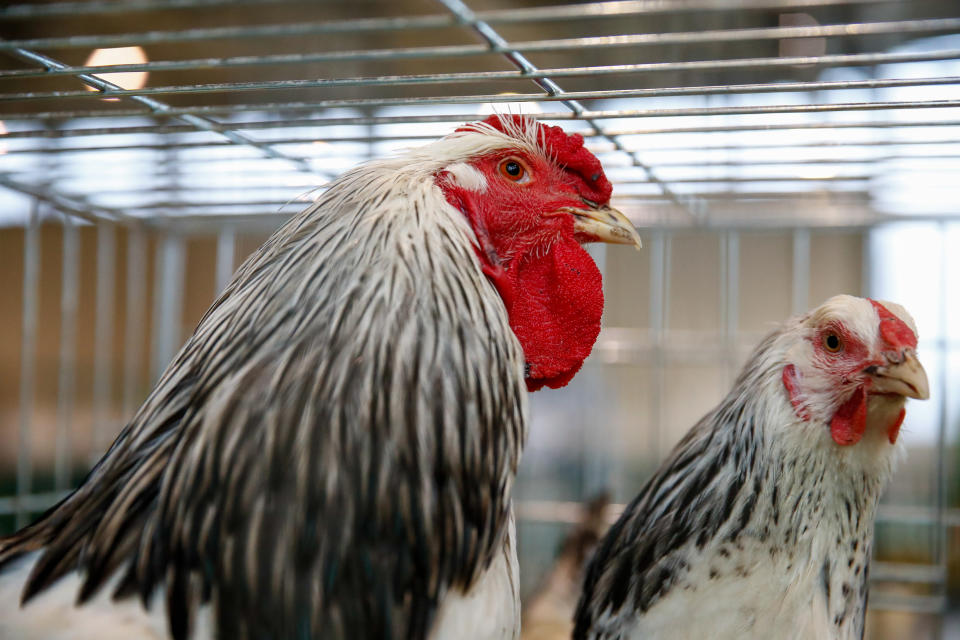UK would be 'morally bankrupt' to allow chlorinated chicken

The government would be “morally bankrupt” to let global trade deals undermine UK food standards, one of Britain’s top farming leaders has warned.
Minette Batters, president of the National Farmers’ Union (NFU), said fears over chlorinated chicken imports were not “mumbo-jumbo” after a minister failed to explicitly rule them out over the weekend.
She urged the government to show “global leadership” in her opening speech at the member organisations’ annual conference on Tuesday.
Batters argued the government must insist other countries accept UK food standards as part of trade talks, and should enshrine animal welfare and environmental protections in its upcoming agricultural bill.
“This isn’t hysteria. This isn’t mumbo-jumbo. This is fact,” she said of farmers’ fears of being undercut by lower-quality imports.
“To sign up to a trade deal that results in opening our ports, shelves, and fridges to food that would be illegal to produce here would not only be morally bankrupt, it would be the work of the insane,” she told NFU delegates on Tuesday.
The warning comes as it emerged the European Union is also reportedly set to demand the UK maintains its ban on chlorinated chicken in trade talks — creating a new potential hurdle to a US-UK agreement.
Read more: Firms demand ‘seat at the table’ in post-Brexit trade deals
The calls also come after comments by the environment secretary George Eustice in an interview with Sky’s Sophie Ridge on Sunday sparked fresh concerns over chlorine- and acid-washed chicken and beef treated with hormones.
Pressed to rule out allowing such products in Britain, Eustice said only that the government had “no plans” to change a current ban or to “make any moves on our standards.” But he also said lactic acid washes were now more commonly used than chlorine in the US.
Brexit gives the government freedom to strike its own trade deals, diverge from EU standards and design its own agricultural policies for the first time in decades. A bill is currently going through parliament on the system of government subsidies that will replace the EU’s common agricultural policy (CAP).
Eustice will use his own speech to the NFU on Wednesday to set out how farmers will receive taxpayers’ cash based on meeting public needs, rather than the amount of land farmed.
A new “flagship green farming scheme” will reward farmers who use environmentally friendly methods, according to a press release by the Department for the Environment, Food and Rural Affairs (DEFRA).
Funds will also be available to farmers adopting animal welfare and health standards above and beyond legal minimums, which are “valued by the public but not sufficiently provided for by the market.”
But the NFU and others fear UK farmers signing up to such standards could be undercut if new trade deals allow countries with lower standards to sell in the UK.
Read more: UK government to hand farmers £2.9bn to replace EU subsidies
Batters said in her speech: “We must not tie the hands of British farmers to the highest rung of the standards ladder while waving through food imports which may not even reach the bottom rung.”
She added: “Why actively encourage opportunities for countries where foot and mouth is endemic to have their beef as a centrepiece on our tables?”
She said other countries did not follow the same rules as Britain on the use of chlorine to wash carcasses, biosecurity, lighting, diet and veterinary oversight.
The issue “isn’t just about chlorinated chicken,” Batters added, with other differences including the use of antibiotics to promote growth in countries including Australia, Japan and Brazil.
Batters, a Wiltshire beef, sheep and arable crop farmer and the NFU’s first female president, argued: “If the government is serious about animal welfare and environmental protection and doing more than any previous government, it must put legislation in the agriculture bill."
But a government spokesperson told Yahoo Finance UK: “We have repeatedly been clear that we will uphold our high environmental, food safety and animal welfare standards outside the EU.
“The government will stand firm in trade negotiations to ensure our future trade deals live up to the values of farmers and consumers across the UK."

 Yahoo Movies
Yahoo Movies 